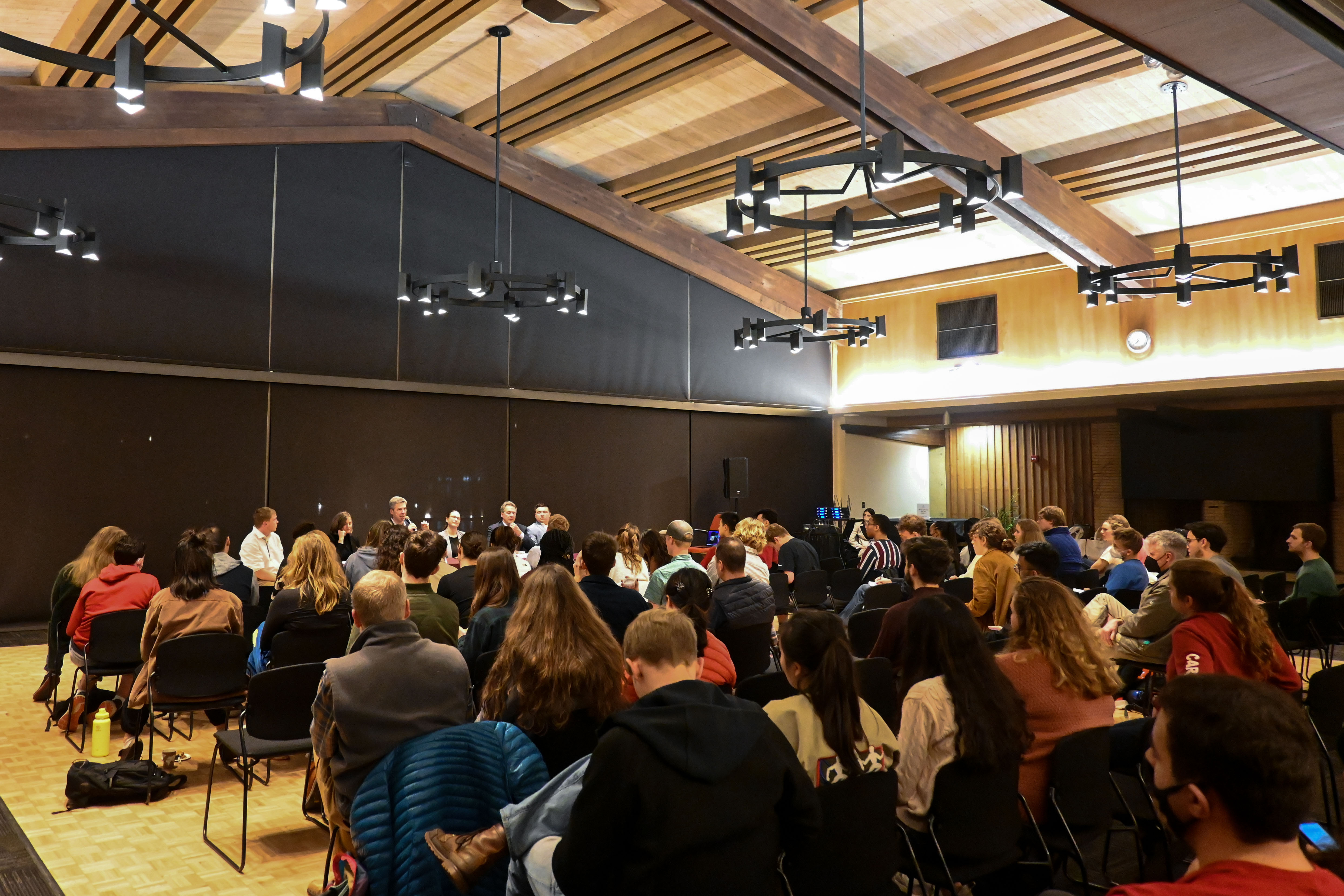Isaac Nehring ’26 felt like a geographic minority at Stanford as one of only six first-year students from Montana. Hoping to address a lack of discussion regarding rural issues at Stanford, Nehring organized the Stanford Rural Development Panel on Jan. 19. The event centered around conversations on green energy, land rights, health access and utilities in rural communities.
An audience of nearly 100 students from rural, suburban and urban backgrounds filled Tresidder Oak Lounge for the event. There, they listened to a panel that included Native American Development Corporation Chief Officer Cora Neumann, Western Native Voice Political Director Keaton Sunchild, former Governor and Attorney General of Montana Steve Bullock, BEAM Circular Bioeconomy Hub Founder and CEO Karen Warner and USDA Rural Utilities Service Administrator Andrew Berke.
Nehring came up with the idea of creating the Rural Development Panel in early October when he found out from his Resident Fellows at Otero — Stanford’s Public Service and Civic Engagement House — that students could apply for grants to support initiatives related to the house theme. Nehring received funding in early November and spent the rest of the fall quarter organizing speakers and other logistics for the event.
Nehring, who is from Helena, Montana, worked in rural politics before coming to Stanford. He said he focused on non-partisan and bi-partisan advocacy for civic engagement, particularly ensuring young people had the ability to exercise their first amendment rights by voting and testifying in the legislature on bills that mattered to them.
“It’s been really apparent coming from Montana that the campus community is made up of very urban people,” Nehring said. “I really hope the panel changes people’s minds about rural communities realizing that there’s a lot more diversity in rural communities, that they’re not a political lost cause, and that they’re not an economic lost cause. It’s about keeping them in mind to the same level that we talk about urban communities, exurban communities and suburban communities.”
The panel started with introductions from the speakers before moving into a discussion on why people should care about rural communities.
Sunchild shared that most of his family lives on the Little Shell Chippewa Cree reservation in Montana. During the COVID-19 pandemic, Sunchild realized the extent to which rural communities, and particularly rural Native communities, lacked the same amenities and resources as urban or suburban communities.
When Sunchild’s great-uncle was diagnosed with COVID-19, he made a telehealth appointment with a doctor due to a pre-existing condition. Sunchild said his great-uncle’s internet was not strong enough for him to get on the Zoom call, and the next morning no one could get a hold of him. Later that day, Sunchild said his wife went to check on him and found his great-uncle dead.
Neumann echoed Sunchild on the importance of ensuring equal access to services in rural communities.
“Just because you’re in a rural community does not mean you should have sub-standard services,” Neumann said. “Where does our food come from? Who cares for the land, water and wildlife? And where is the future of innovation? Rural areas. The future of this country is rural.”
Bullock agreed. He said there needs to be more opportunities and investment in rural communities. “You shouldn’t have to leave your home, school or church to make a decent paycheck,” Bullock said.
Warner, who grew up in California’s Central Valley, said there is a simplification and othering of people from rural areas, one that she has experienced as the rural next-door neighbor of Silicon Valley.
According to Warner, this cultural dissonance has unified residents in rural areas. Many urban neighbors do not understand water issues from a rural perspective, what it is like to produce food, manufacture materials, grapple with low wages or have poor health access, Warner said. She said one way to bridge the divide between urban and rural communities is to extend empathy and genuine listening to unique place-based needs.
Chaitanya Gulati, M.S. ’24, said he attended the panel because, since moving to the United States from India, he has primarily visited urban and suburban areas. Gulati said he wanted to learn more about rural issues in the United States.
Elena Press ’21 M.S. ’23, who grew up in a Philadelphia suburb, said she attended the event for similar reasons, because she was curious about a perspective that is often overlooked at Stanford.
“I was struck by the relative difference you can make in a less-resourced place,” Press said.
